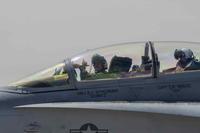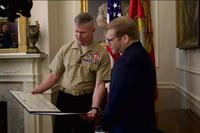The Defense Department's deputy secretary didn't back off the sharp criticism levied Monday at Lockheed Martin by Maj. Gen. Christopher Bogdan, the incoming F-35 acquisition chief .
"We need a government-industry team that can work together. We've got to have that and I think Chris was saying that he has to have that with the Joint Strike Fighter program and I'm with him 100 percent. That is what we need and I think that's what we'll get," Deputy Defense Secretary Ash Carter said Wednesday at the Air Force Association's annual conference.
Bogdan said Monday the relationship between the Defense Department and Lockheed Martin within the F-35 program is the "worst he's ever seen." He told the crowd of Air Force officers and defense industry officials that there is no excuse for the delays in negotiating the F-35's fifth production lot.
“It should not take 10, 11 or 12 months to negotiate a contract with someone we’ve been doing business with for 11 years,” Bogdan said.
A senior Air Force offical at the conference said Bogdan's tough talk was the result of a boiling over of frustrations with negotiating the fifth production lot contract.
Carter trumpeted Bogdan's success in negotiating the fixed-price contract for the tanker. Bogdan recently transition from the tanker program after he was nominated to succeed Navy Vice Adm. David J. Venlet as the F-35 acquisition chief. Carter said he hopes to see the same progress Bogdan achieved with the tanker contract in the F-35 program.
"Chris Bogdan is a tremendous program manager who brings a lot to the Joint Strike Fighter program as he did to the tanker program," Carter said.
The deputy defense secretary admitted the F-35 is in "a very difficult time in the life of a program" saying the Pentagon is focused on controlling costs. Bogdan said he's operating as if there is no money and no time left to add to the program.
Carter made a point similar to Bogdan Wednesday highlighting the need to keep sustainment costs low even in the early days of production. Government accountants estimate the lifetime sustainment cost for the F-35’s planned fleet of 2,443 aircraft could eclipse the $1 trillion mark.
Bogdan's critiques don't signal a waiver in the Pentagon's commitment to the F-35 program, Carter said.
"We've wanted all three variants. It's the center piece of our tacial air modernization program, but at the same time we have to control costs there," Carter said. "And that means doing what we're doing and that is sitting down together and scrutinizing every element across the structure of that program."








